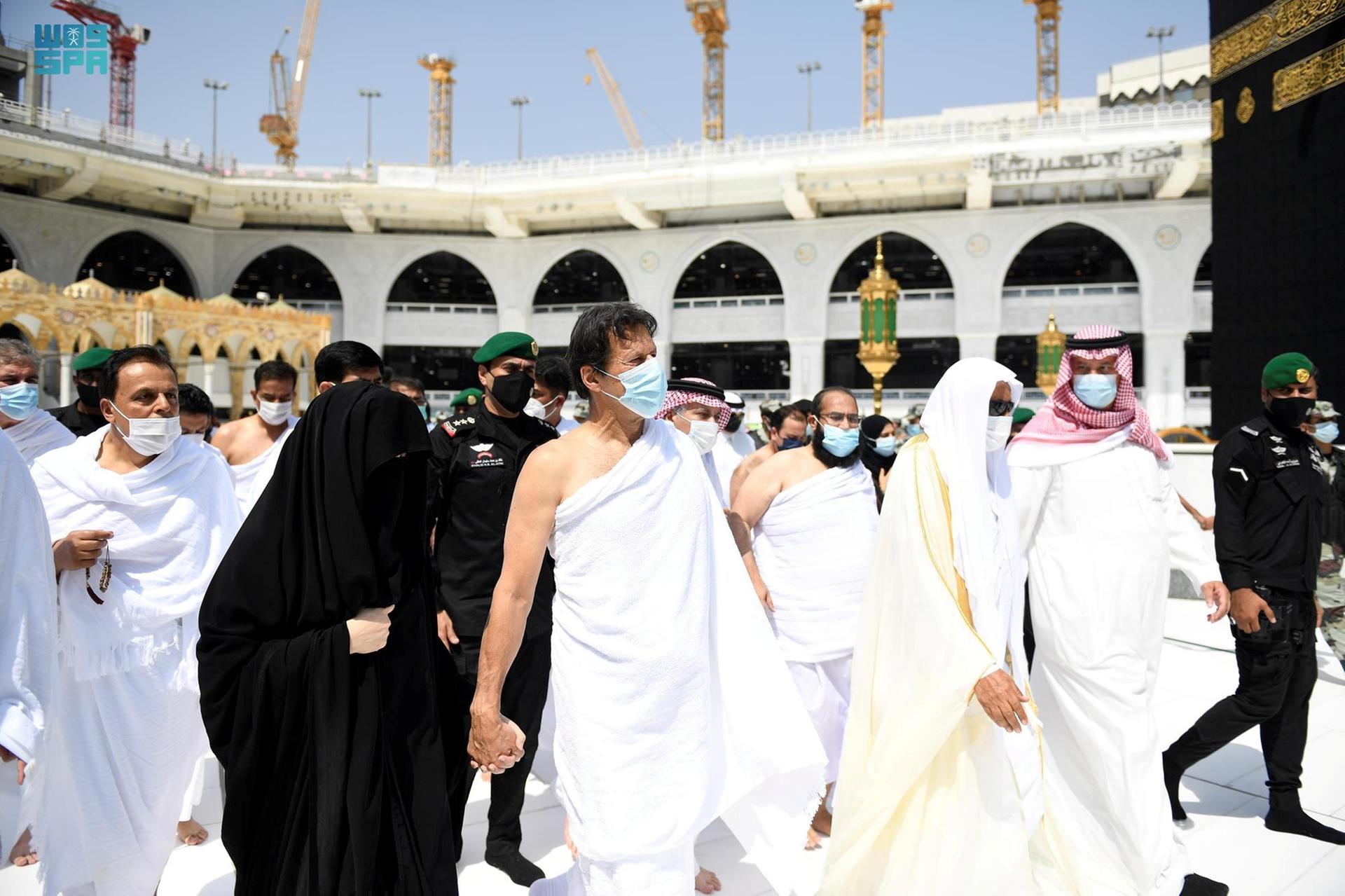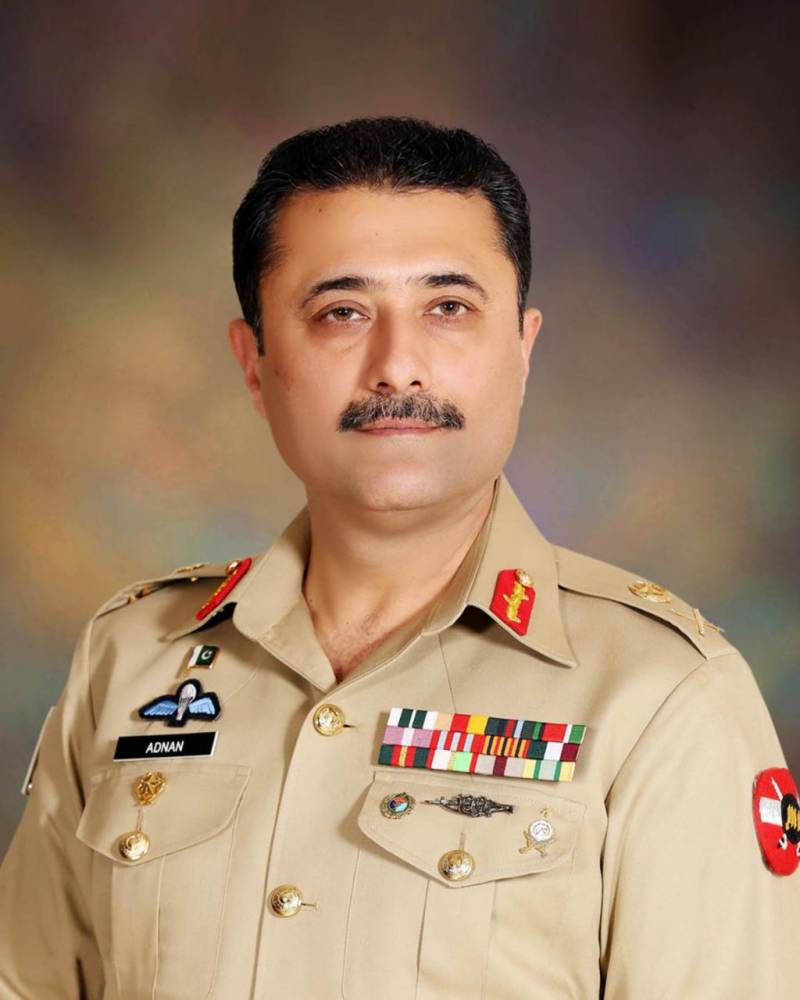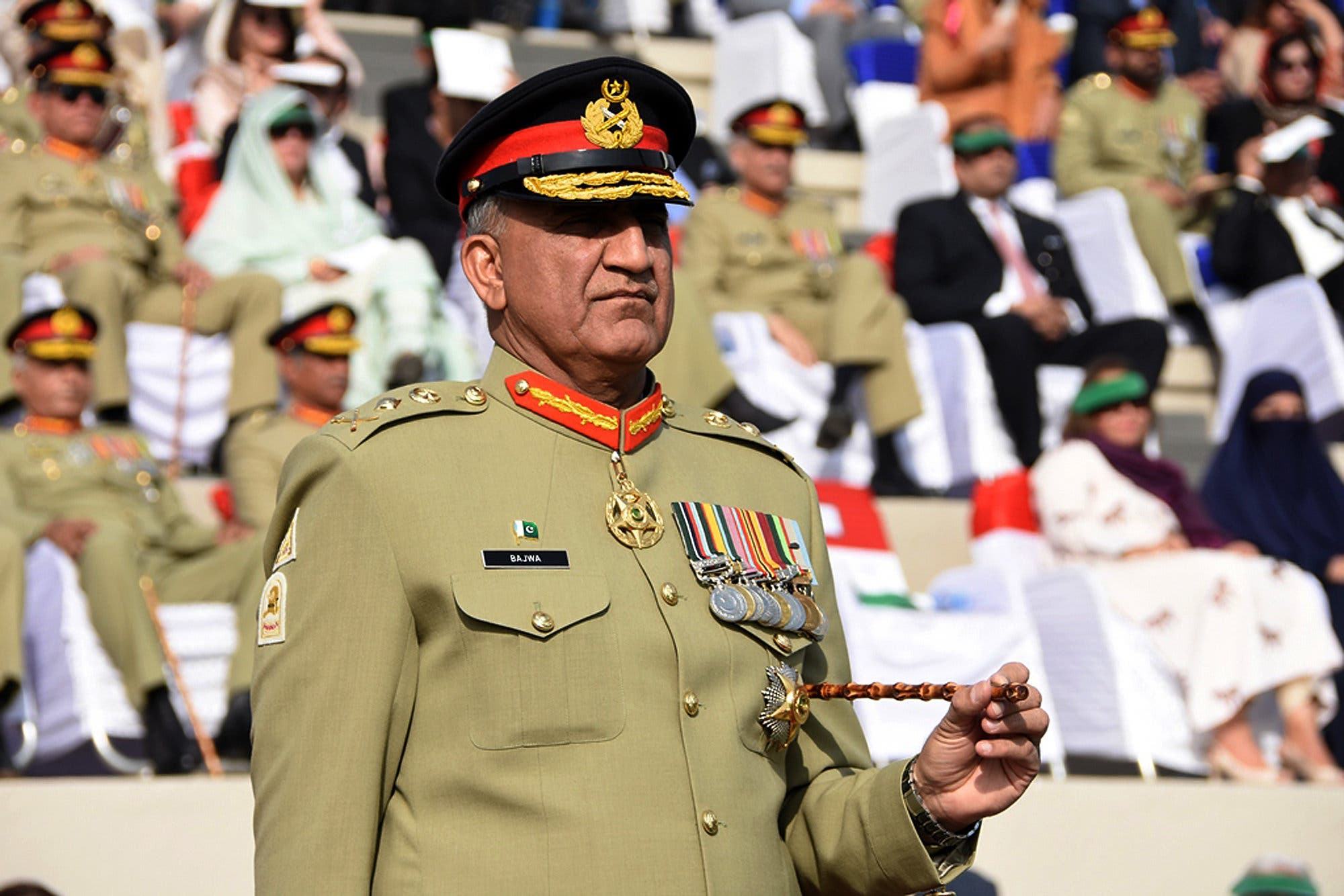
A 20-day old confrontation between PM Imran Khan and the army chief, Gen Bajwa finally ended when the former signed the notification for much awaited appointment of the new chief of the ISI, Gen Nadeem Ahmed Anjum on October 26.
Immediately after his pilgrimage to Mecca, Pakistani Prime Minister Imran Khan returns with the first lady of Pakistan, Bushra Bibi, and signs the crucial notification for much awaited appointment of the new chief of the country’s spy agency, Inter Services Intelligence, Lt. Gen Nadeem Ahmed Anjum on October 26. He is presently the corpse commander of Karachi, he will join on November 20. It is believed that the joining date has been fixed on the advice of Bushra Bibi, believed to have attained spiritual powers to control Djinns. With this notification the, the 20-day old confrontation between Khan and the army chief, General Qamar Javed Bajwa finally ended. With this notification, the decks are now clear for Lt. General Faiz Hameed to become the corpse commander of Peshawar. The delay had almost brought a confrontation between Khan and Bajwa.

Khan and Bushra Bibi, a mother of five children, including three daughters and two sons from her first marriage, were married just six months before his inauguration as the prime minister in 2018. She is a spiritual guru of Khan. Earlier, Khan had married Jemina Goldsmith, the pretty daughter of a rich Jew family, in 1995. She bore him two sons. In early 2015, he married a British Pakistani journalist, Reham Khan, but it lasted only nine months and ended in divorce on October 30, 2015. Bushra being an introvert seldom attends any social function. She is the first veil-wearing spouse of a Pakistani Prime Minister. It appears that the political mentors of Khan, the army headquarters (GHQ), have reconciled to her suggestions, though the delay in formalizing the orders had caused apprehensions in the political circles of the country. It appears that the confrontation between army and Khan has been averted for the time being, but there is trust deficit between the two.
The delay in the notification from the office the Prime Minister (PMO) regarding the appointment of the new ISI chief, Lt. Gen Nadeem Ahmed Anjum, who is presently deployed as the corpse commander of Karachi, is being interpreted as a reason for growing chasm in the existing the civil-military relationship in Pakistan. Few in India care about Samant Goel, the person who heads the Research and Analysis Wing, popularly called RAW, the country’s foremost intelligence agency. However, in Pakistan, who controls ISI, rules the country. In this context, the delay in the appointment of the new ISI chief is being interpreted as ‘reluctance’ on the part of Khan. It is being repeatedly stated that Lt. General Faiz Hameed is one of the closest persons to the prime minister. During his assignment as the director general of the counter-intelligence, he had helped Khan to win the elections in 2018. Khan is now expected to reciprocate the army and its institutions with more funds from the exchequer and also appointing former army officers in key civilian positions. Since its inception in 1947, Pakistan, which was carved out from India, has mostly been under the armed forces. However, the army has allowed civilian proxies during brief interregnums, but if any political leader ever questioned its hegemony, the leader would either be sent to gallows like Z.A. Bhutto or convicted and jailed like Benazir Bhutto or Nawaz Sharif, a three-time prime minister. Benazir, who had returned to Pakistan to contest election during the military dictatorship of Pervez Musharraf, was later martyred in a bomb blast. The civilian leaders were implicated in frame-up charges, and convicted by a docile or manipulated judiciary.

There is a general feeling that the delay in notification regarding the appointment of new ISI chief’s by PMO has triggered off an avoidable controversy. It is being stated that Khan is keen to retain Faiz Hameed as the director general of ISI, but if he does not assume the responsibility of a corpse commander and serve at least for a year on the post, he would not be considered for the position of the army chief, if and when the opportunity comes. It is also stated that he too is keen to assume the new assignment as the corpse commander of Peshawar. Interestingly, the real decision maker is Bushra Bibi. It is expected that she may finally give green signal for the notification. Amidst the growing challenges before his government, Khan’s dependence on Hameed appears to have increased in recent months. The sources close to Khan have asserted that the prime minister would like to retain him till the new elections scheduled in 2023 as the ISI chief, but it might adversely affect Hameed’s career. He would be considered for the post of the army chief, only if he has one year experience as a corpse commander. However, if the present army Chief Qamar Javed Bajwa gets one year extension, most of the present day senior commanders, including Hameed, the aspirants for the top post, would be superannuated, before a successor to Bajwa is selected.
It is now being openly discussed that Khan’s political outfit, Pakistan Tahreek-e-Insaf (PTI), which could be brought to power in 2018 only with the help of the ISI, would be wiped out in next elections unless massive rigging in the polls is again resorted to. However, in the present mood of the country and the army, such a possibility appears to be quit remote. The reluctance of the army to extend support to Khan could be his failure to attain the two key targets, firstly, ensuring easy flow of funds to the security establishment and secondly, demolishing the mainline political parties, Pakistan Muslim League-Noon (PML-N) and the Pakistan People’s Party (PPP).
Bajwa and his cronies in the security establishment had selected Khan with a hope that he being a cricket celebrity with a large popular following would succeed in clipping the growing political clout of the two mainline parties and their leaders. Apart from these two major assignments, Khan had to give a three-year extension to Bajwa without any hassle. However, the faulty notification of PMO regarding Bajwa’s extension led to the intervention of the Supreme Court. Bajwa could finally get the extension, but he had to seek the support of PML-N and PPP, the political outfits he wanted to destroy. The GHQ, despite seeking support of the opposition parties, however, has continued to support Khan and PTI. It angered the opposition parties that they have been openly blaming the army and its generals for undermining the civilian governments in the country. Thus, due to the non-performance of the Khan government, the security establishment’s agenda against the two political outfits appears to have diluted.
Under the Khan‘s regime, during the past three years, the leaders of the two political parties, though framed in various cooked up cases of corruption, have become much more powerful. Earlier, army and its institutions were never openly criticised, but the opposition parties now openly accuse Bajwa and the ISI for manipulating the elections. The Pakistani army and Khan’s hybrid government is unable to unleash a counter campaign against them. Also, the army cannot resort to the Bangladesh-type repression against the people, because most of the army soldiers and officers hail from Punjab, the stronghold of the PML-N. The opposition parties have also formed a joint umbrella, Pakistan Democratic Movement (PDM), which is being led by Maulana Fazal-ur-Rehman, the leader of the Jamait Ulema-e-Islam. In 2021, the PPP and the Awami National Party (ANP) had made tactical decision to distance from the PDM, maybe under the pressure of the ISI, but the recent statement of Bilawal Bhutto against Imran Khan for delaying the notification further shows that Khan would not be able to get any political mileage from the opposition parties, if he dared the GHQ. Khan’s hopes, perhaps, have become a non-starter following the statement of Maryam and Bilawal on this issue. Earlier, there were reports that Khan might be toying with an idea to adopt an aggressive posture against army establishment, especially amidst the reports that the security establishment and ISI are increasingly becoming political neutral. Therefore, in the fast changing political scenario, the possibility of the rejoining of the PPP and ANP to the PDM cannot be ruled out. It is believed that they might have been under the pressure of the ISI to leave the PDM, but the disenchantment of the GHQ with Khan might enable them to join the anti-Khan campaign under the PDM. Maulana’s leadership of PDM has also weakened the possibility of Khan’s attempts to use Islamic radicals against the opposition parties for any political mileage. He had played a key-role during the Soviet occupation of Afghanistan and had trained thousands of armed Jihadis to fight the invading forces.
It is natural for Khan to be upset amidst these political developments. It goes to the credit of Khan that he has focused his full throated campaign against the PML-N and PPP leadership, but PML-N vice president, Maryam’s pending petition before the Islamabad High Court (IHC) has brought the security establishment under the pressure. The IHC bench comprising Justice Aamer Farooq and Justice Mohsin Akhtar Kayani, known for their uprightness has accepted Maryam’s petition, which exposes the ISI tactics and its present incumbent, General Faiz Hameed. Maryam, the charismatic daughter of Nawaz Sharif, who had been three-time prime minister, has submitted graphic details in her petition before the IHC that that how the ISI officials had approached the chief justice asking him to make sure that Nawaz and his daughter Maryam should not be bailed out before the 2018 elections.
She has also quoted an excerpt of a former IHC judge, Shaukat Aziz Siddiqui, who alleged that Faiz Hameed and other military officers had visited his residence to try and “manipulate” case proceedings in 2018 against Sharif and his daughter, Maryam. Siddiqui has made these accusations recently during a hearing before the Supreme Court against his removal from office. In a tweet later, Maryam further stated that the media “for reasons known to everyone” has not highlighted the core subject of her petition submitted to the IHC. She has submitted in her petition that Gen Faiz Hameed, the then DG (counter-intelligence) had also influenced the Accountable Judge, Arshad Malik, who in a video has stated that he was being “pressured and blackmailed” to convict Sharif and his daughter in 2018.
The discomfiture of Khan has enhanced manifold during the past few weeks with the GHQ and judiciary getting much more neutral on their respective “dirty role’ in the country’s politics. Earlier, Nawaz Sharif, in his video addresses in various PDM rallies, has been accusing Bajwa of manipulating the 2018 polls; his daughter Maryam appears to have revised the opposition tactic by focusing much more on the present ISI chief. At a recently held rally in Faislabad, she has ridiculed the reported move of Khan to assert “civil supremacy” on the issue of the appointment of the new ISI chief.
She told journalists in Islamabad that Khan has been deliberately delaying the notification regarding the appointment of the new ISI chief in the name of civilian supremacy. It is just a ‘myth’ and he wants to project himself as a martyr, if he is removed, but the fact is that he has undermined the institution of the armed forces. It is not acceptable to the opposition parties
The Spell of Magic and Appointment
The Pakistani social media is full of reports that Bushra Bibi, indulges in ‘black magic’ and could invoke djinns to enable her husband to remain in power. Maryam has even accused Khan of running the affairs of the country on the basis of magic spells, occult, “Jantar Mantar and Tota Fall”. In reply to a media question, she quipped,” if the magic spell is so successful, why doesn’t Khan employ them to improve the performance of his government and reduce the prices of flour, sugar and diesel.” Maryam was also asked that what would be her party’s response if any unconstitutional step is taken to overthrow the Khan government, she replied, “Khan is not a constitutional prime minister and he must be held answerable; he is neither a constitutional nor an elected prime minister. He is occupying the seat of prime minister by ‘robbing’ the mandate of Nawaz Sharif.” She has also cautioned that “Khan should not try to become a Nawaz Sharif. Her father has sacrificed his government, faced persecution, false cases and imprisonment at the Attock Fort and confronted the agony to see his daughter interned in prison cell. He has also defied diktat and campaigned for honouring the people’s mandate. She was responding to the reports that Khan’s decision to delay in the signing of the notification regarding the appointment of the ISI chief is due to the advice of his wife, Bushra Bibi.
Initially, ISI was established to spy on India, especially following the failure of the newly constituted Pakistani army to annex the Muslim-majority kingdom of Jammu-Kashmir under a Hindu ruler in 1948. However, its role became more and more pronounced in domestic politics, when the spy agency ensured thumping majority for the army dictator, Ayub Khan, during the second presidential election held under a limited franchise rights on January 2, 1965. The ISI ensured the defeat of his rival, Fatima Jinnah, popularly called Māder-e Millat (“Mother of the Nation”), and the youngest sister of the founder of Pakistan’s founder Muhammed Ali Jinnah. She was defeated by a big margin. Two years later, she died in Karachi on 9 July 1967 believed to be due to some ‘unnatural causes’, but the successive military dictators blocked the demand of an inquiry into the causes of her death. Therefore, in this backdrop, it is hardly surprising that Khan has kept the appointment of the new director general of ISI pending since October 6, 2021, awaiting Bushra Bibi’s final nod.
The IMF Refusal
Another challenging task before the Khan government is how to feed 22-crore Pakistanis facing unprecedented economic hardships. Amidst these challenges before his government, Khan has been asked by his mentors at the GHQ to get the 18th Amendment of the 1973 Constitution revised to restore unrestricted financial access of the defence establishment to the country’s dwindling resources. It may be recalled that in April 2010, Parliament had unanimously ratified the Amendment, which had empowered the provincial governments to get financial autonomy to ensure a new revenue sharing system and fiscal rules. It has given statutory powers to the provinces in sharing the flow of income; implications of the joint and equal ownership of natural resources by federal and provincial governments and its impact on the planning process. With the drying up of the western resources received during the Afghan conflicts and the war against terrorism, the security establishment is keen that its financial needs should be met from the country’s budget.
In 2018, Khan was actively helped by the GHQ with a rider that he would end the existing financial sharing system among the Federal and provincial authorities. The GHQ wants that provinces should get the funds only after meeting the financial needs of the security establishment. It is a task, which even a hybrid government of Khan is unable to undertake.
Khan has also failed to serve his mentors, who had expected that apart from the annulment of the 18th Amendment, the new government would be able to decimate the country’s main political parties, the PML-N and the PPP. During the past three years, these parties have become quite vocal against the armed forces, especially against Bajwa and his cronies. The armed forces, which have been venerated by the common Pakistanis, are now facing the wrath of people for installing a ‘non-performing’ government. Khan’s dismal performance on all fronts has further disillusioned the security establishment. The PML-N and PPP have become much more powerful than ever before.
The IMF’s refusal to extend financial assistance appears to have further disheartened Khan and his cronies. He wants to leave the government as a fighter for the civilian supremacy. He knows that he is at the verge of losing the confidence of his mentors. He, perhaps, has the choice either to quite under some pretext or being routed in the polls. There is little hope for the revival of the country’s economic situation, especially after his government’s failure to obtain support from the apex financial institution. His ministers are trying to camouflage by stating that the negotiations with the IMF are still going on. Earlier, on the advice of the IMF, the taxation has already been increased on key products such as petroleum, food grains etc.
A reluctant Khan has already conceded the donor agency’s terms, but it may not be possible to accept its new demand of massive reduction in its defence establishment and the ISI’s international operations. Khan’s mentors at the GHQ would never accept any curtailment of their lavish lifestyle. The IMF’s recent rejection has denied Pakistan the expected one billion USD from the donor agency this month. The amount is not big, but it could have enabled Pakistan to obtain substantial financial assistance on easy terms from European banks and other financial institutions.
Storm in a Teacup
The much-discussed stand-off between the Pakistani army chief, Bajwa and Khan on the issue of the appointment of the DG-ISI, could be just a tip of an iceberg of the deeper issues related to the governance. Khan, who was promoted and installed by the ISI and the GHQ, was expected to resolve the issues related to the governance, foreign policy and find funds for the welfare of the people. His inability to perform is not surprising. Under the hybrid system, army enjoys the state power; he is just a civilian face to enable the armed forces to enjoy power and pelf without imposing martial law.
There appears to be little substance to the rumours that Khan has been toying with an idea of dismissing Bajwa. It has been much discussed in various social media platforms following a speech of Khan, in which he had made a reference regarding the dismissal of the legendary Arab military commander, Khalid ibn al-Walid, by Umar. However, with the full support of his corpse commanders, Bajwa would not tolerate any such move. Four close confidants and ministers of the Khan government were refused entry at the GHQ. They were told that the chief has already communicated the decision of the commanders to the Prime Minister. The suggestion that Khan would be interviewing the generals before finalizing the name of the ISI chief too is beign ridiculed in the social media. Khan’s quote regarding Umar’s the 7th century decision to remove the much-trumpeted commander too has received a flak. It was claimed that it was Khan’s attempt to issue a veiled threat to Bajwa that his tenure could be ended, but he has already been warned about such mindless venture.
During the period, October 6-20, the differences between Khan and Bajwa were much pronounced in the social media. The corpse commanders were reshuffled, which included the deployment of the chief, Lt. General Faiz Hameed, as the corpse commander of Peshawar. However, Hameed is yet to be relieved, because the PMO has yet to issue the notification for replacing him by the corpse commander of Karachi, Lt Gen Nadeem Ahmed Anjum. It is also being stated that Khan already had approved the postings, but later he might have realized that Anjum known for his uprightness might not be “manipulating elections” for ensuring his victory in 2023. The convention is that the transfers of the corpse commanders are done by the army chief, but the ISI-DG’s posting is to be notified by the PMO. The army’s notification had announced the new postings, including the appointment of the new ISI-DG, but the delay in the notification from the PMO has triggered the controversy regarding differences between the Prime Minister and the army chief. The future of Faiz Hameed appears to have also been jeopardized following the civil-military standoff and the allegations against him being openly made.
Imran’s civil supermacy claim has few takers
There are few takers of Khan’s assertions on the issue of civilian supremacy. The three-year regime has been under the Bajwa-Imran-Faiz nexus. Khan’s ‘hybrid’ administration, which is just a martial law having a civilian mask. Apart from implicating the opposition leaders, it has been manipulating judiciary and strangulating media.
Faiz’s secret police is accused of frequently attacking journalists. Many among them die. Its operations are spread across continents. One of them was Saleem Shahzad. His body was found “entangled” in the Upper Jhelum canal. The prominent of those, who survived include Raza Rumi, Ayesha Siddiqa, Taha Siddiqui and Gul Bukhari. They now mostly live outside Pakistan. In April 2014, Hamid Mir, a well-known journalist and news anchor, too had escaped death, when some unknown gunmen fired at him in Karachi. The culprits were never found. Hamid Mir has been fired from his job for his daring observations against the army establishment’s misdeeds. He recently has exposed General Faiz Hameed’s colourful life. His wife opened fire at him, when he was reportedly found with a call girl. The girl is now in India as a mistress of a former chief minister of a northern state. Faiz had escaped naked from the house; later, he was treated at a hospital. The media was fed with a false narrative that he was being attacked by some enemy agent i.e. Indian spy agency, RAW. Interestingly, the call girl’s mother is also remembered in Pakistan as the ‘General Rani’. She was one of the confidants of General Yahya Khan, the army dictator.












